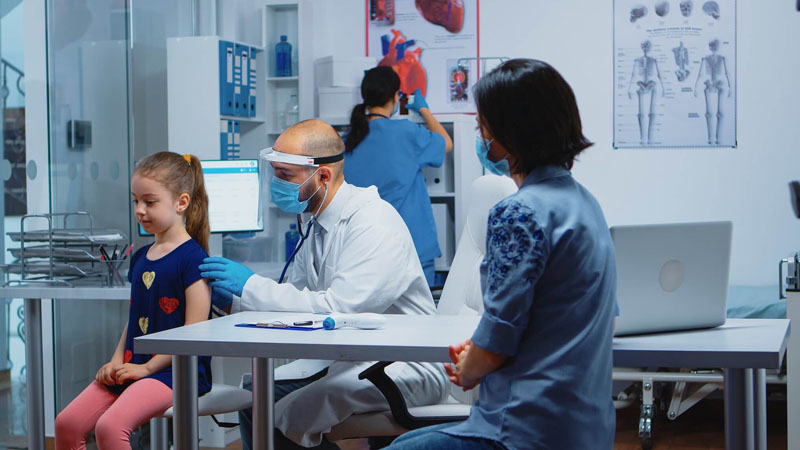Medical exams are crucial for monitoring the health and development of children in their early life stages. During childhood, growth and development are rapid and complex, making certain periodic evaluations necessary to detect health issues early, prevent diseases, and ensure children grow up healthy with appropriate development.
Importance of Medical Exams in Childhood
Medical exams in childhood are a key tool for:
– Identifying congenital problems or diseases that may require immediate treatment.
– Monitoring physical growth, cognitive and emotional development, and the overall maturation of the child.
– Administering vaccines and educating parents about the importance of nutrition, sleep, hygiene, and other healthy habits.
These check-ups are usually conducted during routine visits, where the pediatrician assesses the child’s overall health and development.
Screening Exams in Newborns
The first medical exams for a child begin at birth:
– Apgar Test: Conducted in the first minutes of life to assess the baby’s general condition regarding heart rate, breathing, muscle tone, reflexes, and skin color.
– Metabolic Tests: Also known as “newborn screening,” these tests are essential for detecting metabolic and genetic diseases like congenital hypothyroidism and phenylketonuria. If untreated, these conditions can severely impact the child’s development.
– Hearing Tests: Using non-invasive methods, the baby’s hearing ability is evaluated to detect deafness or partial hearing loss, which is important for language development.
Control Exams in Early Childhood (0-2 Years)
During the first two years of life, babies require frequent check-ups to monitor their growth and development. These exams include:
– Weight and Height Measurement: To ensure the child is growing appropriately for their age and gender.
– Vaccinations: At this stage, children receive vaccines against various diseases such as measles, mumps, rubella, and polio, among others. Vaccinations are essential to prevent diseases that can have serious consequences.
– Psychomotor Development Assessment: Evaluating the development of skills like holding up the head, sitting, crawling, walking, and early attempts at speaking.
Control Exams in Early Childhood (2-6 Years)
During this stage, pediatric visits may be less frequent but remain important. Some of the exams include:
– Vision and Hearing Exams: Visual issues like strabismus or myopia can be detected during this phase, as well as hearing problems that could affect language development and learning.
– Dental Exam: Oral health is crucial from a young age. Regular check-ups and preventive care help avoid cavities and dental issues that can interfere with feeding and language development.
– Language and Social Skills Assessment: Communication skills and social behavior are monitored, which is crucial for identifying potential developmental disorders.
Exams During Middle Childhood (6-12 Years)
During middle childhood, the child undergoes significant physical and emotional changes, necessitating a more comprehensive health evaluation:
– General Physical Exam: The pediatrician assesses the child’s weight, height, and overall development, looking for any signs of obesity or malnutrition.
– Spinal Assessment: Rapid growth can lead to posture issues like scoliosis. Early diagnosis can help avoid more serious problems in adolescence.
– Emotional and Behavioral Assessment: As children grow, it is important to monitor their mental and emotional health, as issues like anxiety, depression, or learning difficulties may arise.
Control Exams in Adolescence (12-18 Years)
Adolescence is a stage of significant physical, emotional, and social changes. During this phase, some recommended exams include:
– Pubertal Development Assessment: To ensure that physical changes associated with puberty are occurring appropriately.
– Mental Health Check-up: At this stage, adolescents are vulnerable to mental health issues like depression and anxiety. Pediatric visits may include evaluations and discussions about emotional well-being.
– Risk Behavior Assessment: Addressing substance use, safe sexual practices, and exercise and nutrition habits.
You may also be interested: Importance of Annual Medical Checkups
Tips for Parents: How to Make the Most of Check-up Visits
To ensure that doctor visits are effective, it is important for parents to prepare and actively participate:
– Do not hesitate to ask any questions regarding your child’s physical, emotional, or social development.
– Keep a record of any changes in your child’s behavior or health observed at home.
– Follow recommendations regarding nutrition, sleep, physical activity, and other healthy practices to maintain the child’s well-being.
Prevention and early detection is crucial to ensure the health of our children and a healthy and full development. At all stages of life, it is essential to resort to medical examinations to prevent serious diseases.
Schedule an appointment now at Doctor Urgent Medical Care to receive the care you need and improve your lifestyle. Your well-being is our main goal!





